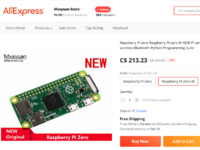avadondragon
Well-known member
I did a little digging but couldn't find a definitive answer. All Raspberry Pi's have become ridiculously expensive unobtanium recently which has me looking for alternatives for various Mac related projects. MacIPgw, RaSCSI, etc. Of course the Orange Pi has been suggested as a good alternative for a MacIPpi but I figured it makes more sense to use an old a$$ intel based tiny PC since they're dirt cheap and even one from almost 10 years ago blows a R Pi 4 out of the water performance wise. Unless TashTalk becomes readily available I don't think I need the GPIO for anything for that application. Am I wrong there?
Anyways the point of my post is that I grabbed a couple of differn't types of RaSCSI about a year ago but I very stupidly only grabbed 1 R Pi Zero 2 W at their normal price when they were available. Now I'd like to get my second RaSCSI usable but Pi prices have me livid. $15 board for $150?!
$15 board for $150?!
The Banana Pi Zero BPIO is pin compatible with its Raspberry counterpart but I wasn't sure how the programming side of things worked. Doesn't anyone happen to have any insight about this?
Anyways the point of my post is that I grabbed a couple of differn't types of RaSCSI about a year ago but I very stupidly only grabbed 1 R Pi Zero 2 W at their normal price when they were available. Now I'd like to get my second RaSCSI usable but Pi prices have me livid.
The Banana Pi Zero BPIO is pin compatible with its Raspberry counterpart but I wasn't sure how the programming side of things worked. Doesn't anyone happen to have any insight about this?

